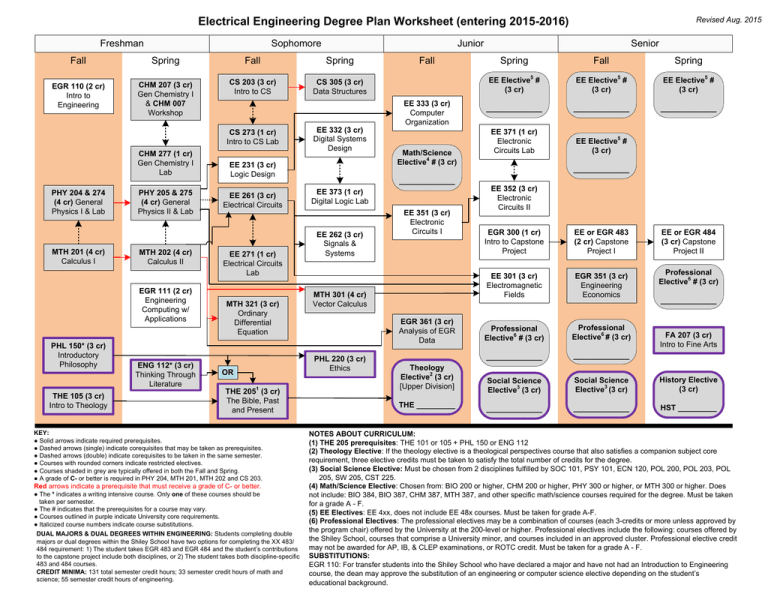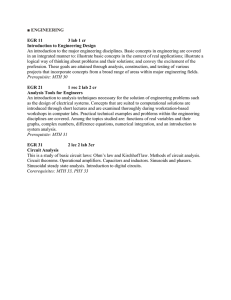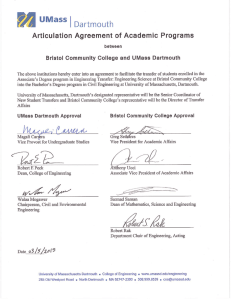Electrical Engineering Degree Plan Worksheet (entering 2015
advertisement

Electrical Engineering Degree Plan Worksheet (entering 2015-2016) Freshman Sophomore Junior Fall Spring Fall Spring EGR 110 (2 cr) Intro to Engineering CHM 207 (3 cr) Gen Chemistry I & CHM 007 Workshop CS 203 (3 cr) Intro to CS CS 305 (3 cr) Data Structures CHM 277 (1 cr) Gen Chemistry I Lab PHY 204 & 274 (4 cr) General Physics I & Lab MTH 201 (4 cr) Calculus I PHY 205 & 275 (4 cr) General Physics II & Lab MTH 202 (4 cr) Calculus II EGR 111 (2 cr) Engineering Computing w/ Applications PHL 150* (3 cr) Introductory Philosophy THE 105 (3 cr) Intro to Theology ENG 112* (3 cr) Thinking Through Literature Fall EE 333 (3 cr) Computer Organization CS 273 (1 cr) Intro to CS Lab EE 332 (3 cr) Digital Systems Design EE 231 (3 cr) Logic Design EE 261 (3 cr) Electrical Circuits EE 271 (1 cr) Electrical Circuits Lab MTH 321 (3 cr) Ordinary Differential Equation OR THE 2051 (3 cr) The Bible, Past and Present KEY: ● Solid arrows indicate required prerequisites. ● Dashed arrows (single) indicate corequisites that may be taken as prerequisites. ● Dashed arrows (double) indicate corequisites to be taken in the same semester. ● Courses with rounded corners indicate restricted electives. ● Courses shaded in grey are typically offered in both the Fall and Spring. ● A grade of C- or better is required in PHY 204, MTH 201, MTH 202 and CS 203. Red arrows indicate a prerequisite that must receive a grade of C- or better. ● The * indicates a writing intensive course. Only one of these courses should be taken per semester. ● The # indicates that the prerequisites for a course may vary. ● Courses outlined in purple indicate University core requirements. ● Italicized course numbers indicate course substitutions. DUAL MAJORS & DUAL DEGREES WITHIN ENGINEERING: Students completing double majors or dual degrees within the Shiley School have two options for completing the XX 483/ 484 requirement: 1) The student takes EGR 483 and EGR 484 and the student’s contributions to the capstone project include both disciplines, or 2) The student takes both discipline-specific 483 and 484 courses. CREDIT MINIMA: 131 total semester credit hours; 33 semester credit hours of math and science; 55 semester credit hours of engineering. Revised Aug. 2015 Math/Science Elective4 # (3 cr) Senior Spring Fall Spring EE Elective5 # (3 cr) EE Elective5 # (3 cr) EE Elective5 # (3 cr) _____________ _____________ _____________ EE 371 (1 cr) Electronic Circuits Lab EE Elective5 # (3 cr) _____________ _____________ EE 373 (1 cr) Digital Logic Lab EE 262 (3 cr) Signals & Systems EE 351 (3 cr) Electronic Circuits I MTH 301 (4 cr) Vector Calculus EGR 361 (3 cr) Analysis of EGR Data PHL 220 (3 cr) Ethics EE 352 (3 cr) Electronic Circuits II EGR 300 (1 cr) Intro to Capstone Project EE or EGR 483 (2 cr) Capstone Project I EE or EGR 484 (3 cr) Capstone Project II EE 301 (3 cr) Electromagnetic Fields EGR 351 (3 cr) Engineering Economics Professional Elective6 # (3 cr) Professional Elective6 # (3 cr) Professional Elective6 # (3 cr) _____________ FA 207 (3 cr) Intro to Fine Arts _____________ _____________ Theology Elective2 (3 cr) [Upper Division] Social Science Elective3 (3 cr) Social Science Elective3 (3 cr) History Elective (3 cr) THE _________ _____________ _____________ HST _________ NOTES ABOUT CURRICULUM: (1) THE 205 prerequisites: THE 101 or 105 + PHL 150 or ENG 112 (2) Theology Elective: If the theology elective is a theological perspectives course that also satisfies a companion subject core requirement, three elective credits must be taken to satisfy the total number of credits for the degree. (3) Social Science Elective: Must be chosen from 2 disciplines fulfilled by SOC 101, PSY 101, ECN 120, POL 200, POL 203, POL 205, SW 205, CST 225. (4) Math/Science Elective: Chosen from: BIO 200 or higher, CHM 200 or higher, PHY 300 or higher, or MTH 300 or higher. Does not include: BIO 384, BIO 387, CHM 387, MTH 387, and other specific math/science courses required for the degree. Must be taken for a grade A - F. (5) EE Electives: EE 4xx, does not include EE 48x courses. Must be taken for grade A-F. (6) Professional Electives: The professional electives may be a combination of courses (each 3-credits or more unless approved by the program chair) offered by the University at the 200-level or higher. Professional electives include the following: courses offered by the Shiley School, courses that comprise a University minor, and courses included in an approved cluster. Professional elective credit may not be awarded for AP, IB, & CLEP examinations, or ROTC credit. Must be taken for a grade A - F. SUBSTITUTIONS: EGR 110: For transfer students into the Shiley School who have declared a major and have not had an Introduction to Engineering course, the dean may approve the substitution of an engineering or computer science elective depending on the student’s educational background.

